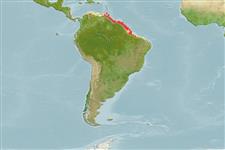Common names from other countries
Environment: milieu / climate zone / depth range / distribution range
ນິເວດວິທະຍາ
ສັດທະເລ; ນ້ຳກ່ອຍ ອາໄສຢູ່ໃກ້ໜ້າດິນໃຕ້ພື້ນທ້ອງນ້ຳ; ລະດັບຄວາມເລິກ 10 - ? m (Ref. 5217). Tropical; 13°N - 9°S
Western Atlantic: West Indies and the Atlantic coasts of Central and South America to southeastern Brazil.
Length at first maturity / ຂະໜາດ / ນ້ຳໜັກ / Age
Maturity: Lm ?, range 24 - ? cm
Max length : 40.0 cm TL ຕົວຜູ້/ບໍ່ມີເພດ; (Ref. 3791); 35.0 cm TL (female); common length : 25.0 cm TL ຕົວຜູ້/ບໍ່ມີເພດ; (Ref. 5217)
Mainly found in brackish estuaries but also in marine and hyper-saline waters (Ref. 5217). During reproduction, they gather in small groups at the mouth of coastal rivers and creeks. Reproduction occurs in the early part of the year. Oviparous, eggs are pelagic and non-adhesive (Ref. 205). Eggs which are rich in yolk are spawned by the millions. Upon hatching, juveniles move up to the swamps and coastal rivers over long distances, to seek for food and to protect themselves against predators (Ref. 35237). Marketed fresh or salted (Ref. 5217). The roe is marketed salt-pickled and dried and considered a delicacy (Ref. 5217).
Life cycle and mating behavior
Maturities | ການສືບພັນ | Spawnings | Egg(s) | Fecundities | ຕົວອ່ອນ
Spawning seems to take place in small groups in river mouths. Females lay millions of relatively large eggs rich in yolk.
Thomson, J.M., 1978. Mugilidae. In W. Fischer (ed.) FAO species identification sheets for fishery purposes. Western Central Atlantic (Fishing Area 31). Vol. 3. [pag. var.]. FAO, Rome. (Ref. 3791)
IUCN Red List Status (Ref. 130435)
CITES (Ref. 128078)
Not Evaluated
Threat to humans
Harmless
Human uses
ການປະມົງ: ທີ່ເປັນການຄ້າໜ້ອຍ
ເຄື່ອງມື
Special reports
Download XML
ແຫຼ່ງອີນເຕີເນັດ
Estimates based on models
Preferred temperature (Ref.
115969): 26.7 - 28.1, mean 27.4 (based on 46 cells).
Phylogenetic diversity index (Ref.
82804): PD
50 = 0.5000 [Uniqueness, from 0.5 = low to 2.0 = high].
Bayesian length-weight: a=0.00977 (0.00595 - 0.01605), b=2.91 (2.78 - 3.04), in cm Total Length, based on LWR estimates for this species & Genus-body shape (Ref.
93245).
ຊັ້ນເຂດຮ້ອນ (Ref.
69278): 2.0 ±0.1 se; based on diet studies.
ຄວາມຢືດຢຸ່ນ (Ref.
120179): ສູງ, ປະຊາກອນຕຳ່ສຸດທີ່ໃຊ້ເວລາສອງໜ້ອຍກວ່າ 15 ເດືອນ (Preliminary K or Fecundity.).
Fishing Vulnerability (Ref.
59153): Low vulnerability (24 of 100).
